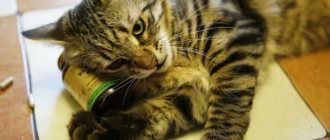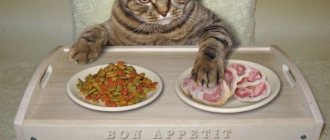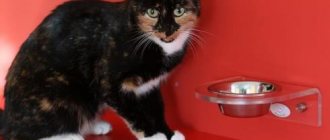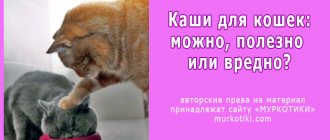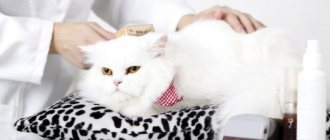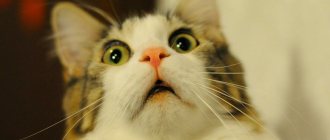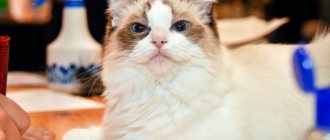Valerian officinalis, popularly called cat herb, has been used in medicine since ancient times. The calming properties of the plant help cope with stress and relieve painful spasms. Despite its sedative properties, valerian causes the completely opposite effect in the cat family.
Without knowing how valerian affects cats and whether it can be given without harm to health, you risk harming the animal. To answer this question, it is enough to analyze the features of the effect of grass on the cat’s body.
Why do cats love valerian so much?
Felinologists have still not come to a consensus why cats love valerian so much. To answer this question, they are guided by 2 theories:
- The smell of the grass is similar to cat pheromones released by females during estrus. The aroma is achieved thanks to the volatile substance contained in the extract.
- The smell of the grass is similar to the odorous marks left by all males of the cat family. This theory is confirmed by the fact that the behavior of domestic and wild felines is identical.
In both theories, love for the plant is explained by stimulation of sexual desire. This fact is confirmed by the fact that kittens are not at all interested in valerian.
Potential harm from consumption
The pungent smell of mint or valerian is transmitted to the brain through the same pathways as drugs (LSD or marijuana) to humans. Cats love valerian because it produces a pleasure similar to drug intoxication . It does not last long - no more than 5-20 minutes, then the animal can calmly go about its business.
Scientists believe that the smell of valerian is vaguely similar to cat urine - and the pheromones of sexually mature individuals cause arousal. This is probably why cats like valerian more, having a stronger effect than on females.
Valerian does not affect representatives of some cat breeds. For example, the Siamese. Kittens under the age of six months do not react either.
The actinidin contained in the composition may be addictive. Regular exposure to odorous substances leads to permanent side effects that affect the nervous system. Think about it: do you need a drug-addicted cat in your home?
How does valerian affect cats?
In addition to stimulating sexual desire, the plant causes narcotic intoxication. Because of this, it is important to understand the boundaries of what is permitted and the possible harm from using a human medicinal product.
Animal behavior
It is impossible to say exactly what will happen if you give a cat valerian. The body's reaction is individual, but in most cases it is accompanied by:
- strong sexual arousal;
- loss of coordination and disorientation;
- aggressive behavior;
- rolling on the floor, scratching or rubbing against an object that retains traces of the tincture;
- copious flow of saliva;
- hissing and trying to hide due to a sudden panic attack;
- hallucinations (catching invisible prey or escaping from a non-existent enemy).
The state of euphoria and excitement lasts up to half an hour. All this time, the central nervous system is actively working, so when the effect ends, the animal falls into deep sleep due to severe nervous exhaustion.
The intensity of a cat's reaction to valerian depends on gender, age and breed. A longer lasting effect is typical for sexually mature males, including castrated ones. Of the females, only 30% react. Kittens either ignore the smell or are afraid of it. Also, little interest is typical for representatives of the Siamese breed.
Harm or benefit?
Due to the way valerian affects cats, its use is only permissible as prescribed by a veterinarian. Medicinal tincture is prescribed for:
- heart pathologies;
- hyperthyroidism;
- diseases of the gastrointestinal tract;
- eczema;
- frequent outbursts of aggression.
Harm can only be avoided with the correct dosage. In all other cases, the substance quickly causes addiction, behavioral disorders, loss of weight and coat quality.
Can a cat become an “alcoholic” or a “drug addict”?
Valerian for cats is a real drug. With regular stimulation of CNS receptors, they become dependent. In search of a new dose, the animal begins to look into the cabinets and constantly scream, demanding the drug from the owner.
Benefits of valerian
A decoction of valerian can solve problems with the gastrointestinal tract; it smoothes the muscles of the stomach, relieving spasms. This drug is also used for endocrine disorders, problems with the nervous system, and even in the fight against eczema.
Oddly enough, cats that are too lethargic and apathetic are also prescribed valerian extract. Although it does have a sedative effect. Long-term use is not recommended as it is addictive.
Some manufacturers use valerian in sedatives for cats. Such funds may be needed when transporting an animal, as well as to help the cat cope with stress after a move, or in the treatment of mental disorders.
Of course, valerian has a number of positive properties, and often one cannot do without it, but it should only be prescribed to a cat by a veterinarian. A medicine, even of herbal origin, always has side effects and can be fatal.
How to influence a cat with valerian
In addition to treatment, some owners use the plant to accustom them to scratching posts and litter boxes, as well as to calm their pets during estrus. Due to the possible harm, the safety of these actions remains a big question.
Training to a scratching post or tray
It is better to accustom him to the toilet and scratching post from childhood. The plant has no effect on kittens, so it is better to choose safer and more effective drugs. Drops are suitable for adult animals, but it is better not to abuse such a training tool.
Is Valerian good for calming cats?
Reducing sexual desire by stimulating it is a disastrous idea. After valerian, cats become even more excited. Their behavior is very difficult to predict, and an incorrectly selected dosage can cause addiction in the animal.
If the smell of a volatile substance can deceive the pet, creating the illusion of the presence of the opposite sex, then such an effect will be short-lived. It won't solve the problem, so it's best to see a veterinarian.
In all cases, sterilization remains the most effective solution. The operation not only eliminates sexual desire and the ability to conceive, but also prevents the development of cancer.
How to treat and diagnose blood clots
When patients are admitted to hospital due to Covid, it is common practice to administer low doses of antithrombotic drugs to prevent blood clots from forming. Since 2021, trials have been conducted to refine the prescribing patterns of these drugs for maximum effect. Diagnosing these blood clots in patients with COVID-19 can also be particularly challenging.
Symptoms of an exacerbation of a pulmonary infection associated with a virus may be indistinguishable from those of a pulmonary embolism. Symptoms of deep vein thrombosis after coronavirus are indistinguishable from classic ones:
What to choose: roots, drops or tablets
The drug has 3 dosage forms: roots, drops and tablets. If you choose valerian for cats, then it is better to avoid tablets and alcohol tinctures. Ethyl alcohol contained in drops can burn the mucous membrane, cause alcohol intoxication and harm the kidneys and liver. The danger of tablets lies in their fillers. The abundance of synthetic substances (75% of the total composition) is fraught with allergic reactions and constipation.
If the doctor recommended a plant for treatment, then it is given to the animal in its natural form - that is, in the roots. You can also prepare a decoction or infusion from the roots, but without adding alcohol.
Anticoagulant drugs
The anticoagulant you are prescribed is based on various factors: kidney function, body weight, and other medications you are taking. Prevention of thrombosis during Covid should be carried out from the first day after diagnosis and continue for at least a month after the cessation of all symptoms of the disease. It is worth keeping in mind that some antithrombotic drugs are derived from animals (porcine origin). There are tablet and injection forms of medications, which are chosen by the doctor.
Can an overdose happen?
In addition to an allergic reaction, the animal may experience an overdose. It is accompanied by:
- complete loss of coordination;
- falling on the side;
- rolling your eyes;
- convulsions;
- copious discharge of foam from the mouth.
If these signs appear, you must immediately take your pet to the veterinary clinic. Otherwise, he may die from cardiac arrest.
To avoid overdose, strictly follow all doctor's recommendations and do not self-medicate. Remember that all medications should be kept out of the reach of pets.
What attracts cats to valerian?
Currently, no specialist can say with certainty what exactly fascinates cats and why they react so much to the aroma of valerian. There are two opinions:
- The aroma of the herbal remedy is similar to the pheromones of their relatives, and therefore it causes them excitement, from which they cannot resist.
- Another common opinion is that valerian for a cat is a kind of narcotic drug, which simply causes a strong craving in a person, and when taking a certain dose, the animal becomes insane and is not responsible for its actions and behavior.
Conclusion: to give or not to give?
The use of valerian for cats for medicinal purposes is practiced very rarely and only as part of auxiliary therapy. In most cases, it is safer to use alternative medications and herbs.
When is Valerian good for cats?
The use of roots and decoctions is permissible for thyroid dysfunction, fever, intestinal spasms, neuroses and muscle atony. In addition to preventing serious pathologies, the herb can help increase activity and restore appetite.
The disadvantages of the plant outweigh its advantages. When treating pets, it is better to use safer drugs, the reaction to which is easier to predict.
Is it possible to give valerian to felines?
Of course, like many medications in small quantities, valerian infusion, even the alcohol-containing one, does not cause any harm to the animal, and if you give it too often, you will simply turn your pet into a dependent drug addict, and fighting such a disease is not very easy. It is worth noting that the product that this plant contains in large quantities can kill your cat, so before you give it to him, think about the consequences. You should not offer valerian to your pet for the purpose of entertainment; remember that he is alive, just like you, and for him these games can be deadly.
If you find an error, please select a piece of text and press Ctrl+Enter.
Not everyone has the same reaction
In fact, not all cats are addicted to valerian; the reaction may vary. Some animals become drowsy, young individuals become lethargic, stagger when they walk, fall off their feet, and sleep for several hours at a time. There are cats that experience a euphoric state from valerian; they can roll on the floor, lick drops from the floor, cling to the packaging with them or chew on it. Others become violent and hyperactive: they purr, rub against their owner’s legs, ride on curtains or sharpen their claws on walls, run around headlong.
Representatives of the Siamese breed do not react at all to “cat grass”; the same can be said about 6-month-old or even younger kittens. Females are not as affected by valerian as males.
The most destructive for animals are tinctures with alcohol (the dry plant has no harm or effect). A cat cannot resist the effects of alcohol, the addiction will worsen over time, and even a single case can be addictive. The cat, like an alcoholic, will ask for a new dose. In case of refusal, the behavior will change to aggression or violence. The character will also undergo a change towards a timid and nervous creature.
To understand what effect valerian has on cats, it would be useful to look at its composition.
Valerian itself is a two-meter plant with umbrella-shaped inflorescences of a pinkish tint. It grows near low-lying, damp places; in pharmacology, it is the root with a loose structure and many shoots that is used. It contains many active components (triterpene glycosides, some types of acids, for example, isovaleric, free-type amines). The acids contained are not safe for cats; if they get on the mucous membranes, they can cause burns.
Is it possible to calm a cat with valerian?
Valerian does not calm cats, but excites them. The long sleep that follows is only the result of a natural change in the processes of excitation and inhibition in the central nervous system. Deep sleep is the cat’s body’s reaction to stress and depletion of internal resources caused by the effects of the drug.
If you give a cat valerian to calm it down, in the first half hour its reaction will be the opposite of the desired one - the animal will first “go crazy”, and only then calm down and fall asleep.
If you need to calm your cat down or euthanize him before a long journey, you can buy special products at a veterinary pharmacy. There are many herbal preparations for animals that are practically safe for them. Some remedies also add very small doses of valerian, which in combination with other medicinal substances can contribute to a sedative effect.
It is not recommended to give an animal any drug before vaccination to calm it down without a veterinarian's prescription. Medicinal components may interact, which can be dangerous to the cat’s health.
On a note
To calm cats, motherwort-based preparations are sometimes used. However, you can only give cats special products purchased at a veterinary pharmacy or pet supply store. Since motherwort does not provide a quick effect, veterinarians advise giving it to cats 4-5 days before the expected stressful situation.
Heat
Often, owners do not know how to cope with their pet during heat. The cat begins to rush outside, screaming loudly not only during the day, but also at night. And if you don’t try to introduce her to the cat during this period, then, of course, a difficult period is coming for you and all the residents of the house. Since the animal begins to behave completely inappropriately.
He always needs supervision. Otherwise, the cat may simply run away and you will not find it. At night the owners stop sleeping. Because loud meowing can be heard throughout the house. In such cases, the owners begin to give the animal some kind of hormonal drug. It often has negative consequences for the pet's health. Owners also use antihistamines. But they can also harm the health of their pets.
And in search of harmless and effective drugs, many owners resort to their favorite cat arphrodisiac, without thinking at all about whether it is possible to give a cat valerian during estrus. Of course, this absolutely cannot be done. Since the cat already experiences a strong sexual attraction to the opposite sex, and then you and your valerian. All her symptoms will simply begin to manifest themselves more aggressively. Therefore, if you are trying to achieve a calming state in an animal, then it is not advisable to give this remedy. The most effective method and more or less safe for the health of cats is sterilization, unless, of course, you are breeding kittens for sale.
Uses of Valerian
So is it possible to give cats valerian or not? Today, some veterinarians still cannot come to a common answer. Because there are cases when this is simply necessary.
For example, when you want to match a cat with a cat, but for various reasons it doesn’t work out for you. At the same time, the female categorically does not allow the male to approach her. Then you can resort to tricks and put a couple of drops on her nose to increase her sexual desire.
Why does valerian attract cats?
The reasons put forward by zoologists why felines are not indifferent to the grass root:
- - a cure for stomach pain, cats look for valerian to treat ailments;
- — the exciting and intoxicating aroma of meun grass is reminiscent of the spirit of hormones formed in the urine of animals ready to mate. This reason is confirmed by the indifference to the aphrodisiac in kittens and cats that have undergone castration.
- - the presence of an almost real addictive drug actinidin (a substance from valerian root with the smell of nepetalactone, a special essential oil contained in catnip - another type of plant loved by cats).
Valerian contraindications. Veterinarians do not recommend using valerian tincture when animals are ready to mate. And so excited cats, when inhaling the smell, will feel a flurry of emotions, negatively and even detrimentally influence the behavior and disposition of their pets.
Those individuals whose bodies were periodically exposed to an alcoholic infusion of valerian at the discretion of the owners often suffered from stomach ulcers, liver diseases and kidney failure. Did the owners know about this, did they want their pets to suffer?
It is worth noting about tablets that their use leads to worse effects compared to the liquid form (drops). 1 piece of tablet preparation contains about 20-25% of the root itself; other substances of synthetic origin can cause allergies. When a tablet enters the body, its reaction is unpredictable, the animal may fall into a state of sound sleep (a visit to the veterinarian is inevitable). These reactions are associated with the motives of pet doctors who do not appreciate the jokes of cat owners. Is valerian harmful to animals – myth or reality?
An interesting feature of the aroma of the plant
So why are cats so attracted and excited by the scent of valerian, while humans are calmed by it? In other words, we can say that this plant is a kind of drug for our little brothers. Valerian extract causes cats to become intoxicated.
They really like it. Smelling this alluring aroma, cats begin to wriggle and purr loudly. If by chance, while walking, they come across a growing valerian in a clearing, they will immediately begin to ride on it, jump, do whatever they want to make the grass release its juices. But not everything is so good.
